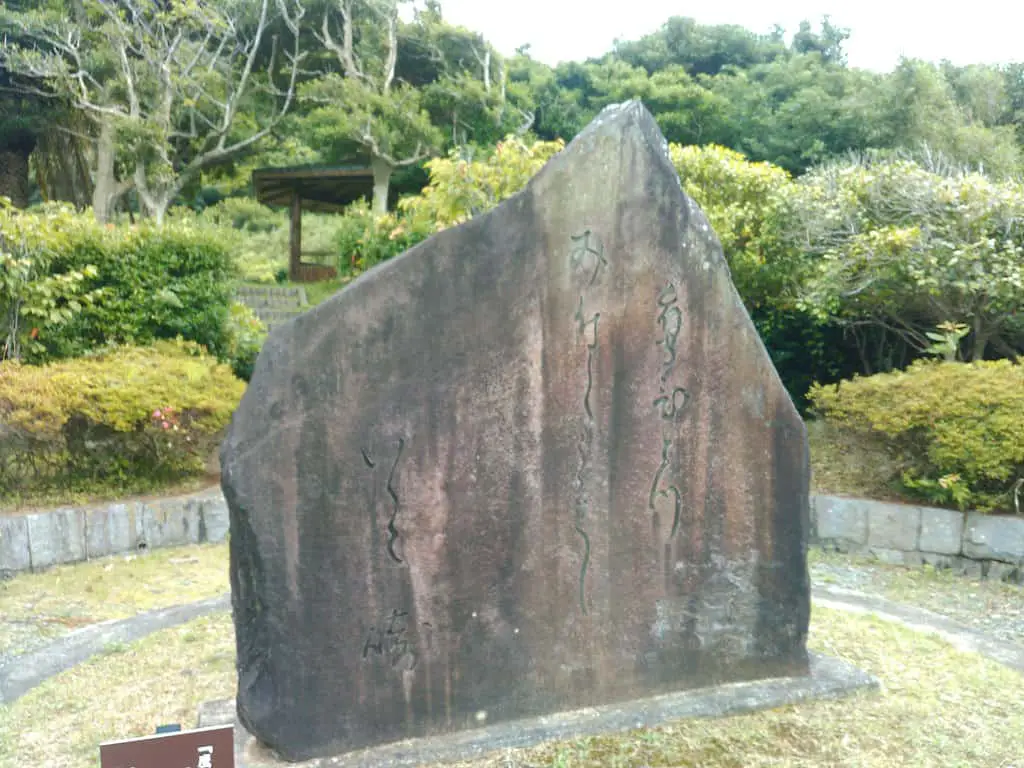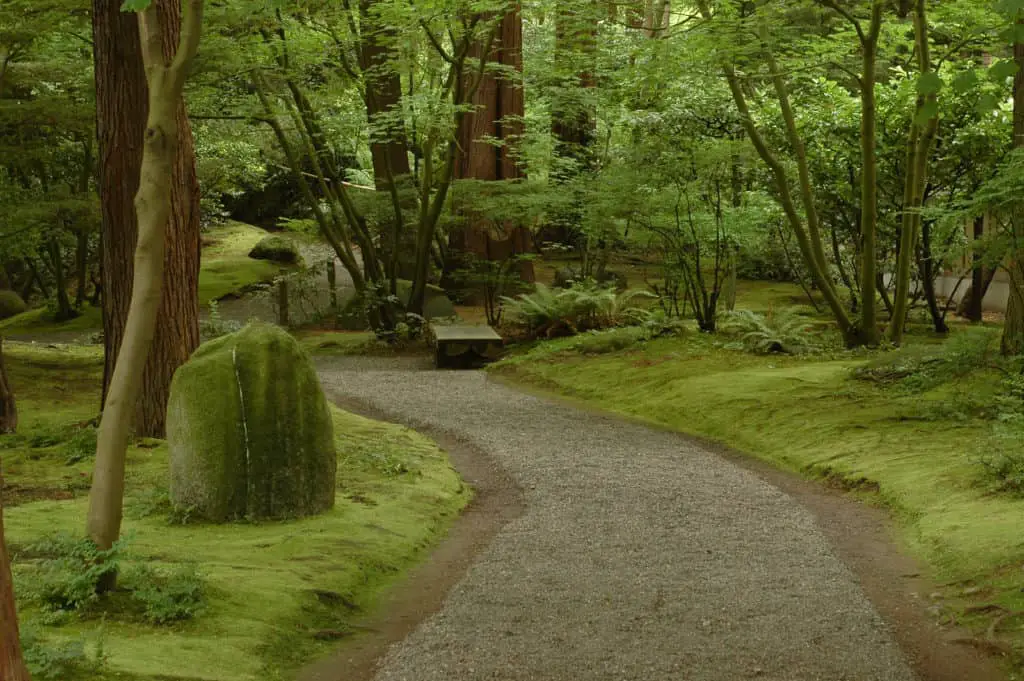
Japanese gardens often feature stones, called 句碑 Kuhi with short poetic inscriptions carved in them. So there is a long tradition of having short pieces of wisdom inscribed in the Japanese garden.
The 19th century Japanologist Lafcadio Hearn has described these monumental stones as being so common in Japanese rock gardens and elsewhere that,
“It is probable, too, that you will become so habituated at last to the sight of inscriptions cut upon rock surface, especially if you travel much through the country, that you will often find yourself involuntarily looking for texts or other chiselings where there are none, and could not possibly be, as if ideographs belonged by natural law to rock formation.”
As Japanese garden designs are usually constructed as wholistic spaces that take in such considerations as the surrounding environment, in the form of shakkei borrowed landscapes that often spill as far as Japanese home decor inside, or the historic context of a place (I think of the rice paddy incorporated into the garden of shugakuin as a nod to the area’s agricultural past), often Japanese garden quotes and poetry overtly or implicitly references and expands the context of the garden itself.
Here I’ve translated and collected some samples of this kuhi poetry stone quotes and placed them beside translations of quotes from famous Japanese gardeners, poets, and Japanologists.
In looking at this topic there is one figure that looms above all the others. The poet Basho.
Basho Nature and Garden Poems

By far the most common poetry to be inscribed on kuhi poetry stones is the work of Basho, who perhaps could be described as “Japan’s Shakespeare”.
Here is a selection of Basho’s poems that reference gardens and nature, many of which you can see inscribed in stones in and around gardens in Japan.
夏草や兵どもが夢の跡
(Natsukusaya tsuwamonodomoga yumenoato)
Summer Grass
And soldiers both
Are dreams long passed
芭蕉 Basho
春もやや けしきととのう 月と梅
(haru-mo yaya keshiki-totonou tsuki-to-ume)
Now spring has come
The scenery conforms
To moon and plum
芭蕉 Basho
庭はきて雪をわするるははきかな
(niwa-haki-te yuki-o wasururu hahaki-kana)
Sweeping the garden,
The broom forgets,
the snow it swept.
芭蕉 Basho
うたがふな潮の花も浦の春
(utagauna ushio-no-hana-mo ura-no-haru)
Lose faith not
in tidal flower
nor spring shore
芭蕉 Basho
咲き乱す桃の中より初桜
(sakimidasu momo-no-naka-yori hatsuzakura)
Displaced
betwixt peach
debutante cherry blossom breaks
芭蕉 Basho
よくみれば薺花さく垣ねかな
(yoku-mire-ba nazuna-hana-saku kakine-kana)
Look close
Shepherd’s Purse blooms
in the hedgerows
芭蕉 Basho
鶯や竹の子藪に老を鳴く
(uguisu-ya takenoko-yabu-ni oi-o-naku)
In the bamboo-shoot grove
The nightingale
Sings the years it knows
芭蕉 Basho
Aiko Morita garden quote
Aiko Morita was a Haiku poet who lived from 1917-to 1947, most for her 虹 Niji (Rainbow) collection of poetry. She was a proponent of the “sketch of life” 写生分 Shaseibun style of writing.

紅梅の花一ぱいに蕊ひらき
Stamen unfold
Crimson plum
In flower bold
森田 愛子(Morita Aiko)
Characteristics of Japanese Gardens
- Respect: A sense of reverence and respect for the earth and all its creatures and plants is fundamental to the aesthetic of the Japanese garden.
- Renewal: Nature renews itself without our help; we need only step back and allow it to happen. This concept of renewal is fundamental to the aesthetic of the Japanese garden.
- Balance: The goal of the designer was not simply to create ‘a beautiful place’ but rather to create a balance between man and nature.
- The idea that balance is achieved when man respects nature by allowing it to be as it was before the arrival of humans, and not interfering with its natural processes. This concept has been around for a long time in many different forms.
- Beauty in nature: In Japan, gardens are not just gardens they are often sacred and spiritual places.
Quotes from famous Japanese gardeners

同じ風景は二度と現れないんだよ。
The same scene never exists more than once.
高橋 武市 (Takahashi Buichi)
Gardening and philosophy have a close coexistence in Japan. The connection between the creation of aesthetic beauty and the beauty of the inner mind is immediately apparent for anyone who visits one of the many breathtaking Buddhist, zen, or otherwise, temple gardens in Japan. The ancient tree, winding path, and Cherry tree nestle closely beside the garden of the mind.
So there is a long tradition of Japanese gardeners and landscape architects expounding on their own personal philosophy, both in direct relation to gardening, and to life more generally. This tradition continues today with modern-day gardeners, many of whom have created their own iconic visionary landscapes, who release tomes of their own musings and incantations.
Here are just a few thoughts from these gardeners reflecting on harmony with nature and life:
愚鈍な生まれつきでも、
努力次第で何事にも成功する。Even a born imbecile,
through effort, can succeed at something.
枡野俊明 (Masuno Shunmyo)

世の中には
濡れ手で粟を掴むような旨いことが、
そうザラにあるわけのものではない。手っ取り早く成功せんとする人は、
手っとり早く失敗する人である。秦の成功には速成もなければ、
裏道もない。あせらず怠らず、
長い道を辛抱強く
進んでいくよりほかはない。人間は活動するところ、
そこに必ず新しい希望が生まれてくる。希望こそは、人生の生命であり、
それを失わぬ間は、
人間はムダには老いない。In the world, nothing is a walk in the park.
Those that try to succeed quickly,
are those that fail quickly.
When people act,
hope is inevitably born.
Hope is humanity’s life force
As long as one doesn’t lose that,
a person does not age in vain.
本多 静六 (Honda Seiroku)
いま確かに生きている。
その実感を体中で
受け止めてください。寒さや暑さ、痛みさえも
生きている実感として
とらえてください。何事も取り組むからには
中途半端ではものにならない。取り組むからには
徹底的に突き詰めていくことで
初めてものになる。You are surely alive.
Hold that truth in your very body.
If you are to take anything on
doing by half-measures comes to nothing.
If you are to take anything on
It is only through diving deeply
that a thing truly takes form.
枡野俊明 (Masuno Shunmyo)
Quotes from Japanologists
From the late 19th century onwards, Japanese aesthetics generally, and Japanese gardens in particular, have been hugely influential the world over. Famous examples include the 20th-century composer and philosopher John Cage who famously was so smitten with the Japanese rock garden at the ryoanji temple on the North-Western outskirts of Kyoto, that he composed a piece of music which he named after the temple.
But from the very earliest days of Japan’s opening from its two and a half centuries of self-imposed sakkoku isolation, people non-native to Japan have fallen in love and expounded the virtues of, Japanese gardens.
There have also been groundbreaking Japanese nationals, such as D.T. Suzuki who made it their life’s work to help people from beyond their home country understand more about what they were seeing. These people often became fluent in foreign languages in order to do so.
Here are a few examples from these thinkers:
D.T. Suzuki

“The rocks are where they are- and this is their will. The rivers flow- and this is their will. The birds fly- this is their will. Human beings talk- this is their will. The seasons change, heaven sends down rain or snow, the earth occasionally shakes, the waves roll, the stars shine- each of them follows its own will. To be is to will and so is to become.”
— D.T. Suzuki
“Zen opens a man’s eyes to the greatest mystery as it is daily and hourly performed; it enlarges the heart to embrace eternity of time and infinity of space in its every palpitation; it makes us live in the world as if walking in the garden of Eden”
— D.T. Suzuki
“Unless it grows out of yourself no knowledge is really yours, it is only borrowed plumage.”
— D.T. Suzuki
“I am an artist at living – my work of art is my life.”
— D.T. Suzuki
Lafcadio Hearn

Lafcadio Hearn was one of the first Western writers to extensively comment on Japanese culture in the period not long after Japan’s opening up to the world after the Meiji Restoration in the late 19th century. He had an interesting pan-national history having been born in Greece, raised in Ireland, living in the U.S.A as a young man, traveling through India before settling in Japan. And we think we are global citizens today!
Lafcadio had plenty to say about gardens:
Verily, even plants and trees, rocks and stones, all shall enter into Nirvana.
Lafcadio Hearn
A Japanese Garden is at once a picture and a poem; perhaps even more a poem than a picture.
Lafcadio Hearn
J. Carter Brown
No one will understand a Japanese garden until you’ve walked through one, and you hear the crunch underfoot, and you smell it, and you experience it over time.
J. Carter Brown
The art of stone in a Japanese garden is that of placement.
Isamu Noguchi
Its ideal does not deviate from that of nature.
Japanese Sayings That Reference Gardens

Japanese also has many proverbs and sayings that refer to nature and gardens. To take just a few:
「立てば芍薬 座れば牡丹 歩く姿は百合の花」
Tateba shakuyaku, suwareba botan, aruku sugata wa yuri no hana
She stands like the Chinese Peony
She sits like the Moutan Peony
She walks like the lily
自尊心は悪魔の庭園に咲く花である。
Self-importance is the flower that grows in the devil’s garden.
As the cherry flower is first among flowers, so should the warrior be first among men.
Japanese garden Quotes: In Conclusion
Many of these quotes and poems point to the fact that the glory of gardening is found not just in the external world, but in the internal world of both the creator and viewer.
Text is sometimes used in Japanese gardens to help create “signposts” that help prime the mind to view and interact with the landscape in various ways.
The Japanese tradition of Kuhi inscribed stones stretches back hundreds of years, and continues to be a vibrant living tradition.
Hopefully, some of these selections of Japanese garden quotes, poems, and texts have helped to get you thinking. Perhaps this post can serve as its own digital poetry stone, planted in the garden of the internet.
Perhaps I’ll leave the last word not to a Japanologist, but to American singer Tom Waits who sings, “Never let the weeds get higher than the garden. Always keep a sapphire in your mind.”
See more Japanese quotes here.
